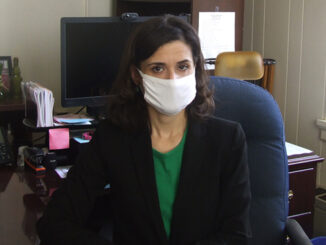
Bill Horton is the Village’s new building inspector
William Horton has served as Cornwall-on-Hudson’s building inspector for the past eight weeks.
His familiarity with the village combined with his previous work experience as code enforcement officer and fire chief in the City of Newburgh allowed for a seamless transition.
Horton, who retired from the city after 18 years with the fire department, wasn’t ready to spend his days sitting on his back porch, so when the position opened in the village, he applied for the role of building inspector. In the early 1990s, he served as a volunteer with Storm King Engine Company and has known officials like Mike Trainor, Dave Halvorsen, and Kurt Hahn for over 30 years.
“The challenges in Newburgh really prepared me well to move to another municipality,” Horton said. “I think it was a good fit and things seem to be moving along pretty well.”
For Horton, public service has been his life’s calling. While attending the University of Buffalo he earned his Bachelor’s degree in mathematics. He also took classes to become an emergency medical technician and was able to secure a job in the City of Buffalo to help pay for school and housing. Eventually he became a paramedic. He later obtained his Master’s in public administration and emergency management from John Jay.
After spending two years in the Navy reserves, Horton returned to his hometown of Newburgh where he started out as a paramedic, eventually joining the fire department and working his way up the ranks.
In April 2017, Horton stepped into the role of code enforcement officer. He explained for many years the building inspector was always deputy fire chief or fire chief in the city. In 2004, the chief at the time didn’t have an interest, nor the experience, to serve in that capacity so a civilian was hired.
After 12 years, the city manager wanted to return to the old model and bring the building department back under the umbrella of the fire chief.
Horton was assistant chief at the time and had already accrued 12 years experience as the code enforcement officer and assistant fire inspector working part time in the Town of New Windsor.
“I had good experience there so I thought I was well prepared to take over the building inspector job. I learned a lot in the city. I took an all-eyes approach to projects.”
It’s common for firefighters to take code classes, said Horton, because it’s important for those running into a burning structure to understand how buildings are constructed. When he attended the fire academy 25 years ago, courses in code weren’t offered, now it’s standard for firefighters to take the first couple of classes.
“If we go into a building for a water leak and we see poor conditions, we should understand what the code requires in terms of plumbing, heating, windows opening, railings being secure.
When going to a call for gas leak, water leak, or fire, if you saw a violation that was a safety issue for tenants we could write a violation.”
When Horton left the city, he was issuing over 150 building permits a month, as well as dealing with numerous housing challenges. Seventy percent of the housing, in Newburgh, are rentals, so Horton found himself dealing with a lot of out-of-town landlords who don’t always do the right thing when it comes to managing their buildings. One of his duties was trying to dial that back by holding landlords responsible and making sure tenants have a decent place to live.
As the new building inspector, Horton said he isn’t going to make wholesale changes to the building department other than try to make data collecting more efficient.
He did say he’d like to work with Office of Emergency Management Coordinator Kurt Hahn to put out a safety newsletter.
This spring Horton said he’d like to get back to conducting fire inspections which had been on hold because of the COVID-19 pandemic. Every time he visits a building, however, he does check to make sure there are smoke and carbon monoxide detectors. Horton is also in the process of working with the Board of Trustees to develop a rental registry to ensure buildings are safe and don’t become a nuisance to neighbors.



